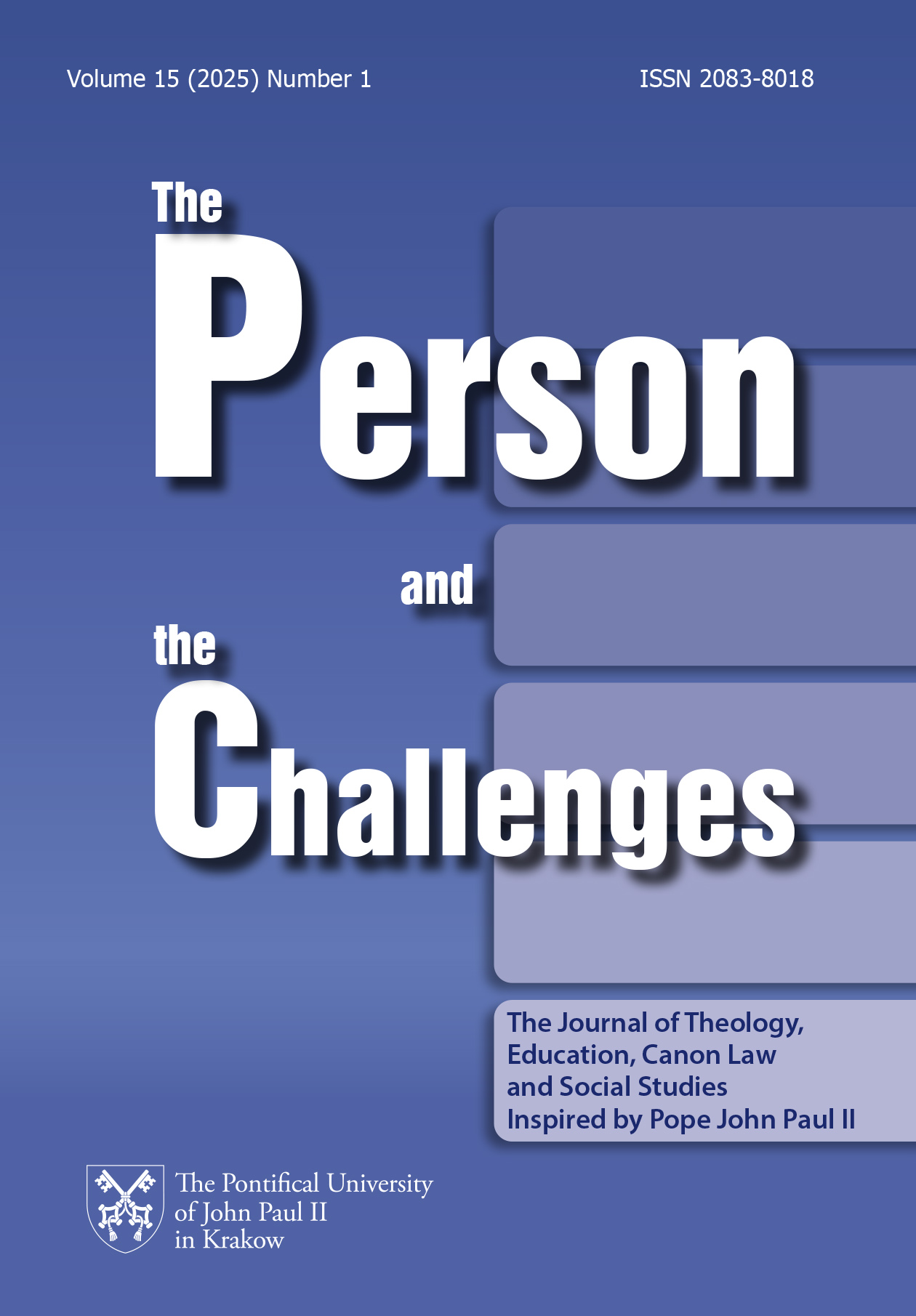Contradictions between understanding sexuality in Catholic education (CE) and comprehensive sexuality education (CSE)
DOI:
https://doi.org/10.15633/pch.15114Słowa kluczowe:
Catholic education, postmodernism, comprehensive sexuality, anthropolog, love, self-giving, inseparable unity of body and soul, procreation, integrated sexuality, disintegrated sexualityAbstrakt
The article raises the problem that understanding sexuality in comprehensive sexual education strongly contradicts an understanding of sexuality in Catholic education. To establish these contradictions and main differences, the qualitative content analysis method was used to evaluate the concept of sexuality in the content of the guidelines for comprehensive sexuality education from a Christian anthropological perspective. An evaluation of the comprehensive sexuality education document in the light of Christan anthropology reveals that the concept of sexuality in comprehensive sexuality education is fundamentally inconsistent with the concept of sexuality in Catholic education.
Bibliografia
Cardinal Newman Society, Policy standards on human sexuality in Catholic education, December 2020, https://cardinalnewmansociety.org/wp-content/uploads/Human-Sexuality-in-Catholic-Education-FINAL-LAYOUT-PUBLISHED-121720.pdf
Catechism of the Catholic Church, Vatican City 1993, https://www.vatican.va/archive/ENG0015/_INDEX.HTM
Congregation for Catholic Education, Male and female He created them. Towards a path of dialogue on the question of gender theory in education, Vatican City 2019, https://www.vatican.va/roman_curia/congregations/ccatheduc/documents/rc_con_ccatheduc_doc_20190202_maschio-e-femmina_en.pdf
Council of Europe, Sexual orientation and gender identity (SOGI). Questions and answers, 2014, https://edoc.coe.int/en/lgbt/7031-sexual-orientation-and-gender-identity-sogi-questions-and-answers.html
John Paul II, Apostolic letter Mulieris dignitatem, 1988, http://www.vatican.va/content/john-paul-ii/en/apost_letters/1988/documents/hf_jp-ii_apl_19880815_mulieris-dignitatem.html.
May W. E, Sex, marriage and chastity, Chicago 1981, Franciscan Herald Press.
McCallum D., Christianity: The faith that makes sense, 1992, Tyndale House Publishers.
Maceina A., Kultūros filosofijos įvadas, “Raštai”, Tomas I, Vilnius 1991, Mintis.
Mifsud R., Sammut G., Worldviews and the role of social values that underlie them, “PLoS One” 18 (2023) no. 7, https://doi.org/10.1371/journal.pone.0288451
Obelenienė B., The anthropological dimensions of the preparation of youth for marriage and family, in: Global Perspectives on Catholic Religious Education in Schools. Volume II: Learning and leading in a pluralist world, 2019, Springer Nature, pp. 405–416.
Obelenienė B., Raktiniai žodžiai pagarbaus santykio tarp vyro ir moters atkūrimo link, “Logos” 101 (2019), pp. 192–198, https://doi.org/10.24101/logos.2019.86.
Obelenienė B., From birth control to self-awareness and free decision making. A model for the evaluation of comprehensive sexuality education from the perspective of women’s health and free informed choice, Kraków 2022, The Pontifical University of John Paul II in Krakow.
Obelenienė B., Narbekovas A., Human dignity as a universal moral dimension of the preparation of youth for marriage and family life. In: J. Stala & J. Garmaz (eds.), Strengthening families, Kraków 2016, The Pontifical University of John Paul II in Krakow Press, pp. 97–108.
Obelenienė B., Narbekovas A., Evaluation of the concept of sexuality in the “Life Skills General program” from the perspective of catholic church teaching, “Soter” 2023, No. 87 (115), pp. 37–54, https://doi.org/10.7220/2335-8785
Oriel J., Sexual pleasure as a human right: Harmful or helpful to women in the context of HIV/AIDS?, “Women’s Studies International Forum” 28 (2005), pp. 392–404, https://doi.org/10.1016/j.wsif.2005.05.002.
John Paul II, Letter to families Gratissimam Sane, 1994, https://w2.vatican.va/content/john-paul-ii/en/letters/1994/documents/hf_jp-ii_let_02021994_families.html.
John Paul II, Apostolic Exhortation Familiaris Consortio, 1981, https://www.vatican.va/content/john-paul-ii/en/apost_exhortations/documents/hf_jp-ii_exh_19811122_familiaris-consortio.html
Francis, Post-synodal apostolic exhortation Amoris Lætitia, 2016, https://w2.vatican.va/content/dam/francesco/pdf/apost_exhortations/documents/papa-francesco_esortazione-ap_20160319_amoris-laetitia_en.pdf.
Pontifical Council for the Family, The truth and meaning of human sexuality, 1995, https://www.vatican.va/roman_curia/pontifical_councils/family/documents/rc_pc_family_doc_08121995_human-sexuality_en.html
Pukelis K., Mokytojų rengimas ir filosofinės studijos, Kaunas 1998, Versmė.
Sacred Congregation for Catholic Education, Educational guidance in human love. Outlines for sex education, 1983, https://www.vatican.va/roman_curia/congregations/ccatheduc/documents/rc_con_ccatheduc_doc_19831101_sexual-education_en.html.
UNESCO, International technical guidance on sexuality education, 2018, https://www.unfpa.org/sites/default/files/pub-pdf/ITGSE.pdf
UN, Transforming our world: the 2030 agenda for sustainable development, 2015, https://sustainabledevelopment.un.org/post2015/transformingourworld/publication.
WHO, Defining sexual health, 2006, https://www.who.int/teams/sexual-and-reproductive-health-and-research/key-areas-of-work/sexual-health/defining-sexual-health
WHO, Sexual health, human rights and the law, 2015, https://apps.who.int/iris/bitstream/handle/10665/175556/9789241564984_eng.pdf;jsessionid=ac430bcf31a98b32799ad5810f74fc86?sequence=1P
Wojtyla K., Love and Responsibility, San Francisco 1993, Ignatius press.
Pobrania
Opublikowane
Numer
Dział
Licencja
Prawa autorskie (c) 2025 Birutė Obelenienė

Utwór dostępny jest na licencji Creative Commons Uznanie autorstwa 4.0 Międzynarodowe.
Autorzy publikujący w czasopiśmie udzielają jego wydawcy zgody o następującej treści:
- Autor zachowuje autorskie prawa majątkowe do utworu, a jednocześnie udziela wydawcy czasopisma zgody na jego pierwszą publikację w wersji drukowanej i wersji online na licencji Creative Commons Uznanie autorstwa 4.0 Międzynarodowe oraz zgody na wykonywanie opracowań, w tym przekładów.
- Autor ma możliwość udzielania zgody niewyłącznej na opublikowanie utworu w wersji, która ukazała się w czasopiśmie (np. zamieszczenia go w repozytorium instytucjonalnym lub opublikowania w książce), wraz z informacją o jego pierwszej publikacji w czasopiśmie.
- Autor może umieścić swój utwór online (np. w repozytorium instytucjonalnym lub na swojej stronie internetowej) jeszcze przed zgłoszeniem utworu do czasopisma.

